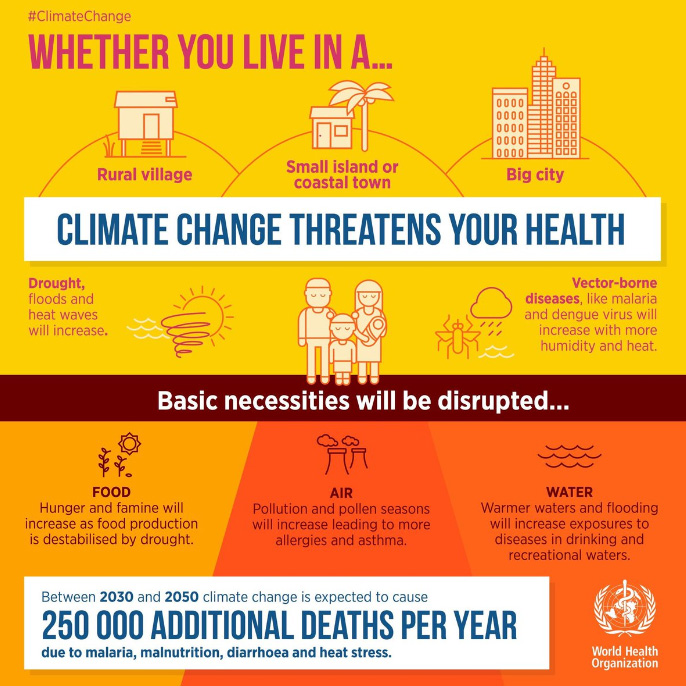Public Health and Climate Change
March 11, 2023 | Expert Insights

In 2017, Hurricane Maria devastated Puerto Rico-- causing significant damage to the island's infrastructure and to the lives of those surviving. Many were left without basic necessities such as clean water and medical care. The hurricane resulted in thousands of people being displaced and further social and economic inequalities and political tensions. While this by itself was a major humanitarian emergency, it was not the first or the last to inflict pain on mankind of such magnitude.
The world continues to experience climate-related disasters, in the likeness of hurricanes and wildfires, at a sickening pace, with frightening regularity. Caught unprepared, even developed nations like the U.S., Australia and EU nations are increasingly finding it hard to deal with them, such is their intensity and frequency. As regards the global south, climate events have potentially destabilised entire regions and led to mass displacement, social unrest, and geopolitical tensions.
Climate change, in particular, has far-reaching impacts on public health, including the spread of diseases, poor air quality and other health risks. Addressing the effects of climate change on public health requires coordinated international efforts. In today’s world, countries are acknowledging such actions, yet such efforts to implement them have been accompanied by a series of challenges and an inundation of divergent global viewpoints.
Background
Barry S. Levy and Jonathan Patz, the authors of "Climate Change and Public Health", warn of significant impacts on human health due to climate change. Extreme weather events such as floods, hurricanes, and heatwaves are likely to increase in frequency and severity, causing injury, illness, and death. Rising temperatures could also spread diseases such as malaria, dengue fever, and foodborne and waterborne illnesses.
The United Nations estimates that climate change could increase the number of people at risk of malaria by 150 to 300 million by 2100. Experts suggest that climate change could indirectly impact public health, leading to food and water shortages and malnutrition, which can weaken immune systems. Marginalised communities are the most vulnerable to these impacts, exacerbating already accumulating health inequalities. Vulnerable populations with limited access to healthcare and resources are at higher risk, as well as children, the elderly, and pregnant women.
India is particularly vulnerable to the impacts of climate change. Various regions are already experiencing severe weather events such as floods, heat waves, and droughts. For instance, in Maharashtra, the monsoon season brought ruinous floods that have caused death and damaged infrastructure and property. Meanwhile, within the same state, the Marathwada region is continually stricken by droughts that create agricultural distress and water shortages. These challenges are taxing on resources to support affected communities within the state.

Analysis
Like many other countries, the Indian state is mindful of the dangers posed by climate change but lacks the funds and wherewithal to combat it comprehensively.
In recent years, India has taken significant strides in promoting renewable energy. The country has set an ambitious goal of generating 175 GW of renewable energy by 2022 and has substantially invested in solar and wind power. Additionally, India has ratified the Paris Agreement and is committed to reducing its greenhouse gas emissions intensity by 33-35% by 2030 compared to 2005 levels. The country has launched several initiatives to promote sustainable development and climate resilience, such as the National Action Plan on Climate Change and the Green India Mission.
Despite these efforts, India still faces significant challenges in addressing the public health impacts of climate change. With over one billion people, the country has limited resources to address the complex challenges posed by climate change. Moreover, significant political and economic barriers exist to implementing effective climate policies at the national and regional levels.
For one, India needs to prioritise the health and well-being of its citizens alongside economic development. This can be achieved through the implementation of policies that promote renewable energy, reduce greenhouse gas emissions, and increase resilience to climate impacts. Only then can India reduce its vulnerability to the negative health consequences of climate change and contribute to a more sustainable future for all.
Thankfully, India is not alone in this fight, as various global organisations are dedicated to tackling the negative health consequences of climate change and are working towards minimising its impact. As the lead organisation, WHO is responsible for setting the pace but stands badly discredited after the COVID pandemic controversies surrounding its role. However, WHO has flagged climate change as a profoundly detrimental public health hazard for this era that necessitates immediate attention from nations worldwide.
Another important player is the Climate and Health Alliance, a network of health organisations working towards mitigating the impact of climate change on public well-being. Their goal is not only advocacy but also promoting policies for sustainable development, which will help prevent further damage from happening while protecting individuals' physical condition. The alliance achieves its objectives through collaboration with medical experts, who tackle the different aspects relating to environmental sustainability issues. These include reducing carbon emissions or improving air quality standards– all aimed at keeping populations safe and healthy despite changing weather patterns brought by climate change worldwide.
The United Nations have put forth the Sustainable Development Goals (SDGs) to tackle climate change and its effects globally. SDG 13 stresses taking action against climate change, while SDG 3 aims to guarantee good health and well-being for all individuals. The overlap between these two goals showcases the necessity of a synchronised effort in handling public health consequences resulting from climatic changes.
The Global Climate and Health Alliance (GCHA) is a union of environmental and health groups striving to heighten knowledge regarding the perils of climate change. Their goal is to lobby for regulations promoting climate action, emphasising low-carbon economies as an alternative while pressing governments worldwide towards reducing greenhouse gas emissions.
2018 witnessed the inauguration of the Lancet Countdown on Health and Climate Change. This remarkable initiative is a product of collaborative efforts between multiple academic institutions, UN agencies, and The Lancet. As an annual report, it monitors advancements made in establishing links between health conditions and climate change occurrences while exploring how these changes affect public welfare across different countries worldwide and assessing their respective responses to this complex challenge.
Assessment
- Although India has made progress in addressing climate change, it has taken a cautious approach to climate action. Historically, there seemed to be a deeper prioritising of economic development and poverty reduction over climate mitigation. Unfortunately for India - one country deeply impacted- current efforts may fall short in safeguarding citizens from hazardous health outcomes caused by weather disturbances due to environmental disruption on a larger scale than before seen globally.
- Despite the magnitude of current attempts, it's evident that there still exists a considerable distance to travel in preserving public health from climate change ramifications. Essential for an organised and efficient response towards this emergency is a cooperation between nations, establishments as well as parties involved. There is a great need for healthcare professionals to incorporate climate change into medical curricula and increase awareness of its links to health.








Comments